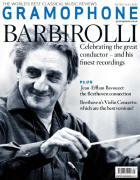Texte paru dans: / Appeared in:
Delos |
|
|
Outil de traduction (Très approximatif) |
|
|
Reviewer:
David Vickers Isabel Bayrakdarian’s superb recital with Tafelmusik (CBC, 7/05) presented key moments for the famous Egyptian Cleopatra by Handel, Mattheson, Hasse and Graun. Nearly two decades later, her follow-up focuses on ‘the other Cleopatra’, daughter of Mithridates VI of Pontus and wife of King Tigranes II of Armenia, all drawn from three treatments of the libretto Il Tigrane attributed here (and elsewhere) to Francesco Silvani, but perhaps written by Pietro Antonio Bernardini. Bayrakdarian’s voice has evolved; what was formerly crystalline and effortless is now darker and forceful. Constantine Orbelian nurtures shapely accompaniments from the Lithuanian orchestra, assisted by expert harpsichordist Jory Vinikour. Most selections from Hasse’s setting (Naples, 1729) sound much the same in tone, style and personality – whether Cleopatra’s haughtiness at a rival (‘Vuoi chi’io t’oda?’), remorse after maltreating her faithful lover (‘Che gran pena traffige il mio core’) or resolve to die and enter the Elysian Fields (‘Degli’Elisi alle campagne l’alma fida’). Vivaldi’s music for Act 2 of a collaborative production (Rome, 1724) includes the heroine falling asleep in a beautiful garden during the cavatina ‘Qui mentre mormorando’ (violins play over arpeggiating violas and solo cello without basses), and she takes a firm heroic stand in ‘Squarciami pure il seno’ (the orchestra is short on textural vitality). Three arias from Gluck’s setting (Crema, 1743) come across best: horns and rushing strings propel stormy tension in ‘Nero turbo il ciel imbruna’, and Cleopatra’s confession that she cannot love the man she is being forced to marry (‘Priva del caro bene’) is underpinned by sympathetic strings – although the tenderness of the moment is diminished by pinched singing. Gluck’s vivid ‘Presso l’onda d’Acheronte’ (solo horn calls and passages for two oboes) is a more feverish vision of Acheron than Hasse’s polite setting of the same words. The musicmaking is a curate’s egg but Baroque opera twitchers might be curious to hear Hasse and Gluck selections never recorded before. |
|




